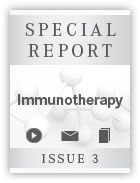The Next Wave in Immunotherapy: Combinations
Advances in our understanding of critical immunomodulatory checkpoints, such as the cytotoxic T-lymphocyte antigen 4 (CTLA-4), have led to some recent notable successes in the immunotherapy of cancer.
Karen L. Reckamp, MD, associate professor and co-director of the Lung Cancer and Thoracic Oncology Program at City of Hope

Karen L. Reckamp, MD
Advances in our understanding of critical immunomodulatory checkpoints, such as the cytotoxic T-lymphocyte antigen 4 (CTLA-4), have led to some recent notable successes in the immunotherapy of cancer.1-3An example is ipilimumab, a humanized monoclonal antibody directed against CTLA-4, which has been shown to significantly prolong survival when used as monotherapy in patients with advanced melanoma.1,3,4
Nivolumab, another checkpoint inhibitor, which blocks the programmed death receptor 1 (PD-1) on activated T-cells, is also under investigation as an immunotherapy in cancer.5Another successful immunotherapy is sipuleucel-T; this immunotherapy entails patient-derived peripheral blood mononuclear cells and antigen-presenting cells, which have been activated ex vivo by prostatic acid phosphatase, and the immune activator granulocyte-macrophage colony-stimulating factor (GM-CSF).2,3,6This treatment has prolonged survival in men with metastatic castration-resistant prostate cancer (mCRPC).6
In a recent panel discussion, Roy S. Herbst, MD, PhD, from the Yale Cancer Center, noted the potential for immunotherapies such as nivolumab to be used in combination with targeted therapies.
Gregory A. Daniels, MD, PhD, on Combining Immunotherapies
Daniels is a professor of medicine at University of California, San Diego.
“We have an agent [nivolumab] that’s going to become a backbone now for combination with some of the other targeted therapies that we use,” Herbst predicted.7
Discussing the rationale for immunotherapy combinations in non-small cell lung cancer (NSCLC), Karen L Reckamp, MD, MS, at City of Hope and Beckman Research Institute, in Southern California, said that “harnessing the immune system is not just about the tumor cell… it’s about the microenvironment and what’s happening there, and we know that the microenvironment promotes metastatic disease, and progression, and so blocking some of those things may be attacking a part of the cancer we’ve been ignoring.”7
Melanoma
A phase III study has investigated the safety and efficacy of dacarbazine, a standard chemotherapy treatment for advanced melanoma, in combination with ipilimumab, compared with dacarbazine alone.8,9The results showed that the ipilimumab combination was significantly better than dacarbazine alone in prolonging overall survival (OS), with a hazard ratio (HR) for death of 0.72 (P<.001), and the benefit was observed for the combination across all of the subgroups examined.9The disease control rate (defined as complete [CR] or partial response [PR] or stable disease) did not differ significantly between the combination and the dacarbazine-alone groups (33.2% vs 30.2%;P=.41); however, the median duration of response (among those with CR or PR) was 19.3 months and 8.1 months, respectively (P=.03), indicating durable objective responses achieved with the ipilimumab combination. There were significantly more grade 3/4 adverse events (AEs) in the combination arm (56.3% vs 27.5%;P<.001). Although AEs were largely as expected with either therapy, elevated liver function test results were identified more frequently with the combination.9
Because they have distinct mechanisms of action, there was also good rationale for the combination of ipilimumab with vemurafenib, a targeted inhibitor of BRAFV600Emutation, which is also approved for the treatment of advanced melanoma.10This phase I study, however, was closed after use of the 2 agents at the approved doses resulted in grade 3 elevations in aminotransferase levels. Although these hepatic events were asymptomatic and reversible with drug discontinuation or glucocorticoid treatment, the findings highlight the need for appropriately conducted clinical trials to evaluate the safety of such combinations.10
Ipilimumab and nivolumab are believed to target complementary immuno-inhibitory pathways leading to enhanced T-cell activation, and thus there is rational basis for combining these 2 immunotherapies. Results of a phase I study demonstrated a confirmed objective response rate of 40% (21 of 52 patients) in concurrently treated patients, which was higher than that historically seen with either agent alone, and the combination was associated with a manageable safety profile.11In view of these initial findings, a phase III study (CheckMate 067) is now investigating the safety and efficacy of nivolumab either alone or in combination with ipilimumab, or ipilimumab alone, in patients with previously untreated advanced melanoma.12The primary endpoint is OS, with secondary endpoints of progression free survival (PFS) and overall response rate (ORR). The estimated completion date for the primary outcome measure is October 2016.
Prostate Cancer
A phase I, open-label, single-center, dose-escalation study was initiated to determine the safety of combining ipilimumab with prostate GVAX, (a GM-CSF gene-transfected tumor cell vaccine) in men with mCRPC.13,14The results of this small study showed the combination of ipilimumab (3.0 mg/kg) with GVAX to be safe and tolerable in this patient population; the most common AEs were injection site reaction, fatigue, and pyrexia. A 50% or greater decrease in prostate-specific antigen (PSA) was noted in 7 patients (25%) who had received a 3.0 mg or 5.0 mg dose of ipilimumab.14
Studies are also assessing ipilimumab in combination with other prostate cancer therapies, including abiraterone/prednisone,15androgen deprivation therapy,16and docetaxel,17for their potential use in men with advanced or mCRPC.
In addition to sipuleucel-T, immunotherapies for prostate cancer include the PROSTVAC vaccines (viral-based vaccines that are thought to enhance the T-cell response to PSA).2A phase I, dose-escalation trial of PROSTVAC in combination with ipilimumab reported no dose-limiting toxicities among 30 patients, and the combination did not seem to increase immune-related AEs over ipilimumab alone.18Although the trial was too small to evaluate efficacy of the combination, 58% of patients who were chemotherapy naïve had PSA declines, and the trial provided proof of concept for this type of combination therapy in prostate cancer.18Sipuleucel-T in combination with ipilimumab is also under investigation in a phase I study of advanced prostate cancer,19and in a phase II study with either delayed or immediate ipilimumab treatment in mCRPC.20
Lung Cancer
Lung cancer is another area of investigation for immunotherapy combinations. CheckMate 01221is a phase I study investigating nivolumab as monotherapy or in combination with multiple therapies in patients with stage IIIB/IV NSCLC, including platinum-based chemotherapies (gemcitabine/cisplatin, pemetrexed/cisplatin, carboplatin/paclitaxel), antiangiogenesis therapy (bevacizumab), and epidermal growth factor receptor (EGFR)-targeted agents (erlotinib); the study will also investigate the combination of nivolumab with ipilimumab in this patient population. The use of ipilimumab in combination with mutation-targeted therapies (crizotinib or erlotinib) is being investigated in a phase I trial of patients with stage IV NSCLC with corresponding mutations; the overall goal is to evaluate a recommended phase II dose and to assess short- and long-term toxicities of these combinations.22
A phase II study is also investigating the use of ipilimumab in combination with conventional chemotherapy (carboplatin and etoposide) in patients with small cell lung cancer; the primary outcome is PFS at 1 year.23A phase III study is investigating ipilimumab (or placebo) in combination with paclitaxel and carboplatin in subjects with stage IV/recurrent squamous NSCLC; the estimated primary completion date for this trial is October 2015.24
References
- Wolchok J. How recent advances in immunotherapy are changing the standard of care for patients with metastatic melanoma.Ann Oncol. 2012;Sep 23(suppl 8):viii15-viii21.
- Kono K. Current status of cancer immunotherapy.J Stem Cells Regen Med.2014;10(1):8-13.
- Sharma P, Wagner K, Wolchok JD, Allison JP. Novel cancer immunotherapy agents with survival benefit: recent successes and next steps.Nat Rev Cancer.2011;11(11):805-812.
- Hodi FS, O’Day SJ, McDermott DF, et al. Improved survival with ipilimumab in patients with metastatic melanoma.N Engl J Med.2010; 363(8):711-723.
- Topalian SL, Hodi FS, Brahmer JR, et al. Safety, activity, and immune correlates of anti-PD-1 antibody in cancer.N Engl J Med.2012;366(26):2443-2454.
- Kantoff PW, Higano CS, Shore ND, et al; IMPACT Study Investigators. Sipuleucel-T immunotherapy for castration-resistant prostate cancer.N Engl J Med.2010;363(5):411-422.
- Novel Immunotherapy Combinations in NSCLC. Available at:http://www.onclive.com/peer-exchange/nsclc-therapies/Novel-Immunotherapy-Combinations-in-NSCLC. Accessed Aug 5, 2014.
- Clintrials.gov NCT00324155.
- Robert C, Thomas L, Bondarenko I, et al. Ipilimumab plus dacarbazine for previously untreated metastatic melanoma.N Engl J Med.2011;364(26):2517-2526.
- Ribas A, Hodi FS, Callahan M, Konto C, Wolchok J. Hepatotoxicity with combination of vemurafenib and ipilimumab.N Engl J Med.2013;368(14):1365-1366.
- Wolchok JD, Kluger H, Callahan MK, et al. Nivolumab plus ipilimumab in advanced melanoma.N Engl J Med.2013;369(2):122-133.
- Clintrials.gov NCT01844505.
- Clintrials.gov NCT01510288.
- van den Eertwegh AJ, Versluis J, van den Berg HP, et al. Combined immunotherapy with granulocyte-macrophage colony-stimulating factor-transduced allogeneic prostate cancer cells and ipilimumab in patients with metastatic castration-resistant prostate cancer: a phase 1 dose-escalation trial.Lancet Oncol.2012;13(5):509-517.
- Clintrials.gov NCT01688492.
- Clintrials.gov NCT01498978.
- Clintrials.gov NCT00050596.
- Madan RA, Mohebtash M, Arlen PM, et al. Ipilimumab and a poxviral vaccine targeting prostate-specific antigen in metastatic castration-resistant prostate cancer: a phase 1 dose-escalation trial.Lancet Oncol.2012;13(5):501-508.
- Clintrials.gov NCT01832870.
- Clintrials.gov NCT01804465.
- Clintrials.gov NCT01454102.
- Clintrials.gov NCT01998126.
- Clintrials.gov NCT01331525.
- Clintrials.gov NCT01285609.

Savona Discusses First-Line JAK Inhibition for Patients With Myelofibrosis at Risk of Anemia
April 17th 2024During a Case-Based Roundtable® event, Michael Savona, MD, and participants discussed the case of a patient with myelofibrosis and moderate anemia receiving JAK inhibitor therapy.
Read More